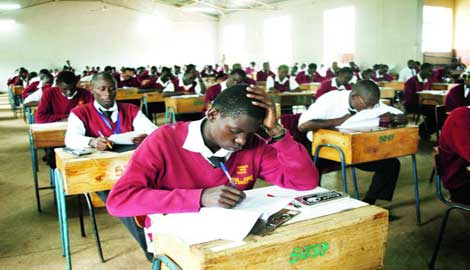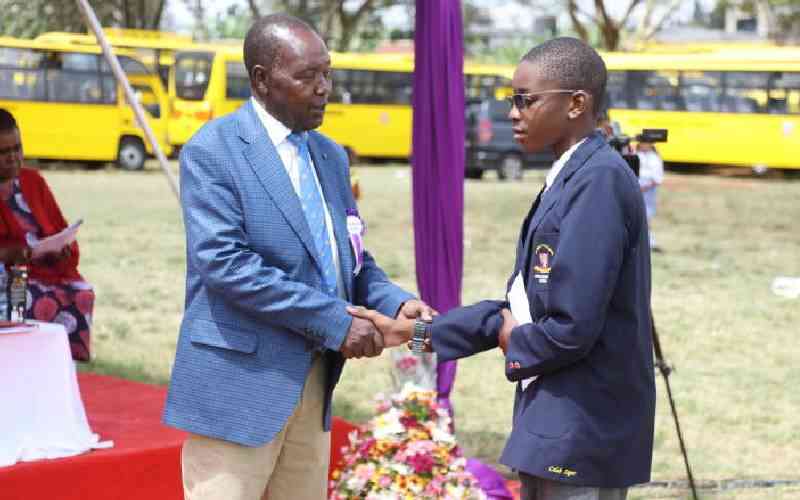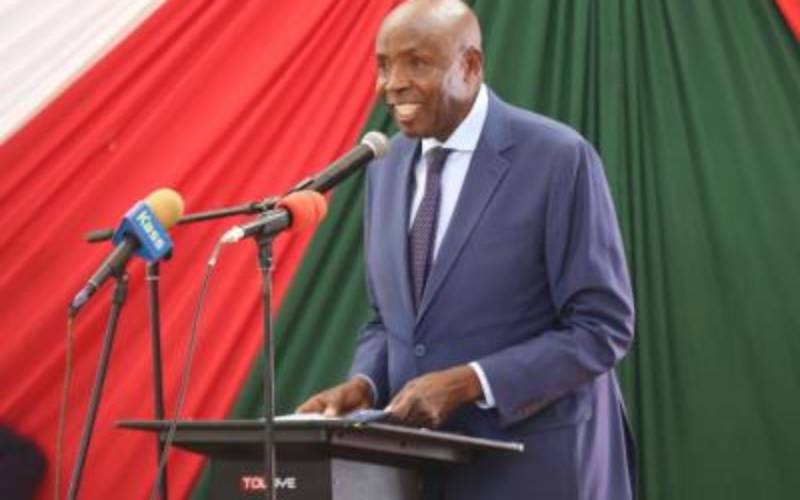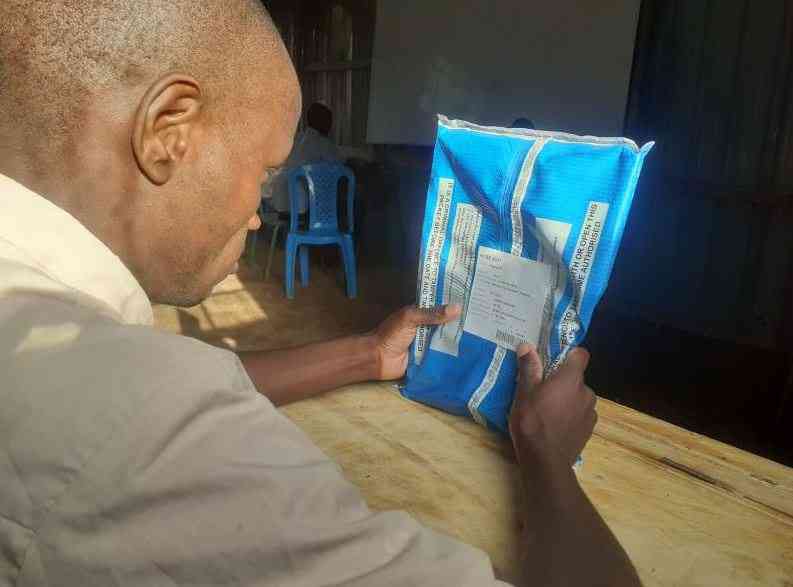 |
|
KCSE candidates at Langata high school sit their English paper one exam |
The first batch of students selected to Form One under a policy that favoured public schools over academies are sitting the Kenya Certificate of Secondary Education (KCSE) examinations whose main papers begin on Tuesday.
The candidates comprise the 4,527 that were selected to national schools in 2011 when the Government introduced the quota system in secondary school admissions as part of affirmative action for Standard Eight candidates from public schools.
Some 485,547 candidates in 8,211 examination centres will sit the KCSE examinations.
The examinations, whose main theory papers begin with English functional writing on Tuesday, are set to offer an opportunity to the public to assess if national schools will pay the price of admitting lower performers from the 2010 Kenya Certificate of Primary Education (KCPE) examinations.
Kenya Private Schools Association chief executive officer Peter Ndoro predicted that schools that admitted top performers from private academies who were locked out of national schools due to the new quota rule would have an improved performance.
“We expect a significant improvement from the extra-county schools that admitted the KCPE candidates who failed to be admitted to national schools,” Ndoro told The Standard on Sunday.
“The rule meant that the extra-county schools admitted top brains at the expense of national schools.”
Disadvantaged students
Ndoro said the association had started a campaign to pressure the Government to drop the rule starting next year. “There is no need to discriminate between children from private and public schools,” he said, adding that the number of national schools had risen to 105. Last year, the number was 78.
Of the total number of KCPE candidates admitted to the then 14 national schools in 2011, then Education minister Sam Ongeri picked only 1,224 candidates from private schools, a move that angered private school owners who took their grievances to court. They lost the case.
The rest, 3,293 candidates, who joined the national schools that year came from public schools.
“The Government’s policy is aimed at enhancing access, equity and quality at all levels of education,” Prof Ongeri said when he rolled out the policy in January 2011.
The Government’s move was meant to address concerns that students from public primary schools, who are presumed to be disadvantaged in terms of education facilities and social background, were losing out in national school admissions to the better endowed private institutions, commonly referred to as academies.
A survey by The Standard on Sunday in several national schools found out that there was anxiety over the performance of some of the candidates who gained places in national schools with lower marks.
But the Deputy Principal at Alliance High School, Mr Nicholas Ndege, said the institution’s performance would not be affected despite the fact that some candidates gained admission with lower marks compared to previous years.
Stay informed. Subscribe to our newsletter
The number of candidates admitted each year to national schools through the quota system has been rising. At Alliance High, 348 candidates are sitting the national examinations, up from 276 last year.
And at the neighbouring Alliance Girls’, the number has increased from 250 candidates to 327.
“Our numbers have gone up consistently as a result of the increased intake every year. But I am confident we will do well,” Mr Ndege said.
In a circular to candidates, the Kenya National Examinations Council (Knec) has warned candidates against leaving the examination room before the end of the period allocated to any paper except with special permission from the supervisor.
Cancelled results
“No candidate is permitted to leave, take a question paper or answer booklet out of the examination room,” the circular said.
The council also warned candidates against communicating with each other or carrying any materials to the examination rooms. “You may only use mathematical tables printed by KNEC, and these should not contain any additional notes except the printed information,” the circular said.The council reminded candidates of the KNEC Act 2012 that require a candidate who commits an examination irregularity in any paper to have results cancelled.
A total of 134,435 staff will manage the KCSE examinations, according to KNEC acting chief executive Dr Joseph Kivilu.
“We have 24,283 supervisors, 55,505 invigilators, 48,576 security personnel and 6,071 drivers for KCPE while 8,188 supervisors, 27,874 invigilators, 14,936 security personnel and 1,999 drivers for KCSE,” said Dr Kivilu.
The KCPE examinations that will start next month will be administered to 889,107 candidates.
Source: INB-Africa News, [email protected]
 The Standard Group Plc is a
multi-media organization with investments in media platforms spanning newspaper
print operations, television, radio broadcasting, digital and online services. The
Standard Group is recognized as a leading multi-media house in Kenya with a key
influence in matters of national and international interest.
The Standard Group Plc is a
multi-media organization with investments in media platforms spanning newspaper
print operations, television, radio broadcasting, digital and online services. The
Standard Group is recognized as a leading multi-media house in Kenya with a key
influence in matters of national and international interest.
 The Standard Group Plc is a
multi-media organization with investments in media platforms spanning newspaper
print operations, television, radio broadcasting, digital and online services. The
Standard Group is recognized as a leading multi-media house in Kenya with a key
influence in matters of national and international interest.
The Standard Group Plc is a
multi-media organization with investments in media platforms spanning newspaper
print operations, television, radio broadcasting, digital and online services. The
Standard Group is recognized as a leading multi-media house in Kenya with a key
influence in matters of national and international interest.










